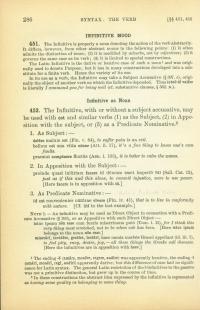451. The infinitive is properly a noun denoting the action of the verb abstractly. It differs, however, from other abstract nouns in the following points: (1) it often admits the distinction of tense; (2) it is modified by adverbs, not by adjectives; (3) it governs the same case as its verb; (4) it is limited to special constructions.
The Latin infinitive is the dative or locative case of such a noun1 and was originally used to denote purpose; but it has in many constructions developed into a substitute for a finite verb. Hence the variety of its use.
In its use as a verb, the infinitive may take a subject accusative (§ 397.e), originally the object of another verb on which the infinitive depended. Thus Iubeō tē valēre is literally I command you for being well (cf. substantive clauses, § 562, Note).

